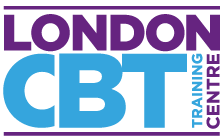Post Graduate Diploma in Cognitive Behavioural Therapy (IAPT High Intensity Training)

Next Intake: March 2024. Search NHS Jobs for available training places
Search for ‘Trainee High Intensity CBT Therapist’ at https://www.jobs.nhs.uk/candidate/search
Train to become a High Intensity Therapist for the national IAPT Programme! a full time clinical training in CBT undertaken as part of a paid position as a High Intensity Trainee Therapist
The Improving Access to Psychological Therapies (IAPT) Programme is a national initiative that aims to support Primary Care Services in implementing National Institute for Health and Clinical Excellence (NICE) guidelines for people suffering from depression and anxiety disorders.
The Post Graduate Diploma in CBT (IAPT High Intensity Programme) that has been specifically commissioned by the IAPT Programme (Department of Health) to deliver the required clinical training to a proportion of the new workforce, based in a large number of the London and out of London IAPT clinical services. This highly successful and well regarded programme has been running since 2008 and was part of the ‘first wave’ of High Intensity Training.
The Programme aims to:
- Provide individuals who are employed in IAPT Clinical Sites with a thorough clinical training in CBT specifically focused on anxiety disorders and depression.
- Support Trainees to develop a comprehensive and critical understanding of the theoretical basis of CBT alongside research evidence of its effectiveness for different types of clients.
- Provide the necessary supervised practical experience that will enable graduates to be competent in the safe and independent application of ‘High Intensity’ psychological interventions within IAPT Clinical Sites.
Application for the March cohort is made direct to the NHS Talking therapies services who will advertise available posts on NHS Jobs November-Jan
- Programme Structure
- About the Programme
- Programme Team
- Assessment
- Entry Criteria
- Fees & Application
- Further Information
The Programme runs for 12 months, beginning in March 2024. Trainees attend the programme two days a week (Thursdays & Fridays). The first day focuses on lectures and workshops with experiential practice and skills coaching. The second day focuses on small group supervision of clinical cases as well as use of seminar-based learning and further skills coaching. Students work in their IAPT sites for the remainder of the week. This is a full time training programme where there is a high degree of integration between the teaching and supervision that occurs on the course and clinical practice in the IAPT service. Students are Paid a full time salary for the duration of the training and do not pay course fees.
In line with the aims of IAPT, our Programme has been designed to equip students with a high degree of skill in CBT for depression and anxiety disorders. The teaching and assessment strategy reflects these aims and the learning outcomes are consistent with the CBT competency framework developed by Roth and Pilling (2007).
For further information on the CBT competency framework below:
http://www.ucl.ac.uk/clinical-psychology/CORE/CBT_Competences/CBT_Competence_List.pdf
By Successful completion of this course you will be able to demonstrate:
- Comprehensive knowledge of the fundamental principles of cognitive behaviour therapy as well as the contemporary evidence base for its effectiveness and its limitations
- Comprehensive knowledge of cognitive behaviour therapy for anxiety and depression, together with an understanding of its use in other disorders
- Understanding of some of the current competing and complementary approaches to CBT and key debates in the field.
Successful trainees will also be able to:
1. Work with complex issues arising in CBT practice reflectively and creatively, construct maintenance and developmental conceptualisations of cases, and develop treatment plans;
2. Demonstrate a capacity to practice CBT independently and with appropriate supervision;
3. Develop the capacity to take professional responsibility for clinical decision-making in complex situations in a manner that is sensitive to context as well as professional requirements and regulations; and continue to learn independently from continuing professional development.
The Programme is divided into three modules, covering mastery of the fundamentals of CBT, CBT for anxiety disorders and CBT for depression. The final module is dedicated to assisting students to complete their ‘accreditation portfolio’ which provides evidence of them completing all the requirements for professional accreditation.
Supervised Practice
Supervised practice is central to the Programme and is integrated with formal teaching. Students will be seeing clients presenting with anxiety and depressive disorders as part of their duties in the IAPT Clinical Service and will work in collaboration with their supervisors and managers to identify suitable training cases.
Students will receive training supervision as part of the Programme which focuses on the development of their clinical skills in CBT. Students are required to see a minimum of eight clients. These clients must be seen for a complete course of therapy. BABCP accreditation requires a minimum of 200 hours of client contact.
Dr Rita Woo: Programme Director
Dr Louise Payne, Dr Rita Santos, Dr Tamara Cilliers, Dr Angie Jenkins
The range of assessments used reflects the aims of the Programme and include:
- Clinical case studies that assess students’ ability to (1) make theory-practice links; (2) devise and implement appropriate intervention plans and (3) critically evaluate and reflect upon their work
- Written assignments in the form of short and extended essays to examine knowledge of theory and research
- Audiotapes of clinical sessions, played regularly in supervision as well submitted for formal examination
- Use of the Cognitive Therapy Scale for self-assessment and formal examination of clinical competence
- A log book detailing casework carried out during the training
Additional support for student learning is available through our Personal Advisor Scheme, personal tutorials and individual supervision sessions.
Teaching is pitched at a post-graduate level so candidates need to be able to produce academic work to this level relatively independently.
The course is an academic post-graduate course requiring evidence a capacity for critical and independent thought. Preference will be given to candidates with demonstrable experience in systematic therapies with a commitment to the CBT approach. Applicants will need to demonstrate the following:
- A professional mental health qualification (e.g. clinical psychologist, mental health nurse, BACP accredited counsellor) with relevant clinical experience.
- Those without a core profession who have at least two years’ post-qualification experience and are able to demonstrate they meet the required KSA criteria. Information on the KSA route can be found here: http://www.babcp.com/Accreditation/CBP/KSA.aspx
Fees
Students are paid a full time salary for the duration of the training and do not pay course fees.
Application
Interviews are planned for December 23- January 24. Places on the course are obtained via application to NHS Talking Therapies services who have opted to provide training posts.
Selection interviews are undertaken in collaboration with the Talking Therapies clinical services. Applicants are applying for a Training Post as so the selection interview is an employment interview as well as an interview for a full time training programme.
Please make sure you have read and understood all of the above information before you contact us for further information. Further information can be gained by contacting our Senior CBT Administrator at eligijus.jakavickas@nhs.net

